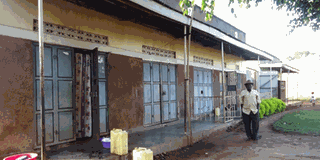Savings cooperative improves Mukono teacher’s livelihood

Kyazze stands near his commercial building. PHOTO BY FRED MUZAALE
As you approach Kabimbiri trading centre, along Kayunga–Mukono highway, there is a large plantation of eucalyptus, sugarcane and cocoa. It belongs to David Kyazze, 62, head teacher of Nakifuma C/U Primary School in Mukono District.
Kyazze, who started commercial farming 15 years ago, is a member of Mukono-Kayunga Teachers’ Savings Cooperative Society (Sacco).
The Sacco is one of the cooperative societies, which receive support from the Micro-finance Support Centre Ltd, which facilitates access to financial and business development services. It manages rural micro-finance support projects and offers loans and skills training.
Kyazze earns Shs3m a month but his long story of success did not come easy. Having joined the teaching profession in 1980, he faced several hardships.
“Teaching was calling but at some point I considered quitting it. At some point I didn’t want to be called a teacher,” he says adding, “The salary was meagre. I had no house and I was wearing cheap clothes and an old pair of shoes.”
He devised means of coming out of his situation. He had many things in mind, which he wanted to do to achieve. But despite having plans, he lacked the money to start.
In 1990, the Sacco’s management made a drive to encourage teachers in the district to join. Kyazze was reluctant to join. But later, he decided to start saving with the Sacco. He wanted to accumulate savings to start business.
In 2000, he got his first loan of Shs2m which he added to his savings and used it to set up a commercial building in Kikandwa village. While he used two rooms, he rented out three rooms at Shs50,000 each. He paid back this loan in two years.
Kyazze then bought three acres of land where he grew beans and maize. But the market for the produce was limited and prices low. “At only Shs1.5m, I bought five acres of swampy land. The owner thought it was unproductive,” he adds.
Eucalyptus
Using proceeds from the rentals, he got another loan of Shs2.5m, which he used to clear the swamp and planted eucalyptus. “I bought each seedling at Shs500 and started with one acre on which I planted 2,000 trees. With time I extended to five acres,” he says. In total, he bought 10,000 seedlings.
Recently he had the first harvest of eucalyptus planted 13 years ago. “There were 800 pieces of timber which I sold at Shs6,000 and got Shs4.8m,” Kyazze says. “I expect Shs400m from my tree plantation in 15 years.”
Cocoa
Next year, he plans to retire but he is not afraid of going into retirement. In 2011, he planted cocoa on three acres, which will “pay” him handsomely when he retires.
“I got a loan which I used to buy seedlings at Shs500 each. There are 10,000 trees from which I will earn Shs5.5m every season. But this will increase as the trees grow older,” he says.
“In fact this cocoa will enable me educate my grandchildren since all my children have completed schooling and also live a better life.”
Sugarcane
There is also sugarcane which is planted with the eucalyptus. From sugarcane alone, he earns about Shs20,000 daily. He sells the sugarcane to surrounding schools such as Kikandwa P.S.
“My standard of living has improved. Now, I cannot be called a poor man as they used to do,” Kyazze says.
Ms Teo Nabuuma, his neighbour, says Kyazze is a hardworking man which she says has put him where he is.
Sacco management speaks out
Fred Kaganga, general manager, Mukono/Kayunga Teachers’ sacco, says the cooperative would not have managed to offer loans to its members such as Kyazze if it was not the support from The Micro-finance Support Centre.
“Our Sacco gets some of the funding which we loan out to members. This has enabled members, who are teachers mostly, to carry out their projects as the loans have a small interest rate,” Kaganga explains. “The Sacco which begun in 1979 with 11 members has grown to 4,000.”
They are encouraging the rest of the teachers in the district join in order to prosper like Mr Kyazze has done.
“Teachers should stop complaining because this wil not solve their problems. The solution is to pool their resources and make investments,” he advises
Rosette Nakanwagi, marketing and communication manager, the Micro-finance Support Centre, says the Centre started working with Mukono-Kayunga Teachers’ Sacco in 2004.
“On top of extending credit, we have also been providing capacity building through training in management so that they can manage the Sacco effectively,” she says adding, “We also provide onsite support technical support, which has helped the organisation grow stronger.”
She advises teachers from other districts should emulate their counterparts in Mukono and Kayunga and form Saccos that would enable them to work together and overcome their challenges.
The microfinance support centre
The Micro-finance Support Centre was founded in 2001. It is mandated to facilitate access to affordable, sustainable and convenient financial and business development services to Ugandans. It is tasked with managing rural microfinance support projects. It also offers loan products and skills training to clients in the agricultural sector.




